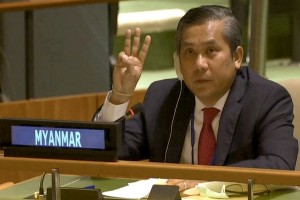
Ambassador Kyaw Moe Tun
New York: In one of those rare moments where a country’s envoy speaks against the events in his own country, Myanmar’s Ambassador to the United Nations, Kyaw Moe Tun, surprised many people by announcing at an informal General Assembly meeting on the Myanmar crisis today, that he was representing not the military leadership, but the National League for Democracy – the political party which was the ruling the countryfrom 2015 to the 2021 coup d’état.
Tun said he was speaking for the democratically-elected parliamentarians of the country. As he denounced the coup, he told the General Assembly that the continued and strong support for the people, was “imperative”, and appealed for all Member States and the UN, to condemn the military takeover of the country. He also called upon the United Nations to take “all strongest possible measures to stop the violent and brutal acts committed by the security forces against peaceful demonstrators, and end the military coup immediately”. As he spoke, his voice broke and he also gave the three-fingered salute adopted by protesters in Myanmar, declaring that he would join those continuing “to fight for a government which is of the people, by the people, and for the people”.
Immediately there were widespread concerns about the Ambassador Tun following his speech — ranging right from the status of his position as ambassador to the safety and security of his family members back home. To a question on what could be the message of UN Secretary-General to the Member States if the ruling military junta tried and sacked Tun, the Spokesman for the Secretary-General said that “Who sits in the chamber, who recognizes… who is recognized as an authorized representative, that’s an issue for Member States to decide, to challenge through the Credentials Committee”. However, the Spokesperson, Stéphane Dujarric, went on to add: “But I thought it was a very moving moment and, frankly, a very courageous moment, from what I saw.” He also reaffirmed that the Secretary‑General’s message was one of support for the people of Myanmar, “who very clearly expressed their democratic wishes, and for the military to respect it”.
Tun’s addressed, hailed by many as “courageous”, though made many including UN officials worried about his family in Myanmar. To a question on what was the message from the Secretary‑General to the military authorities if they were considering any sort of reprisals, Dujarric said: “Look, no one should be harmed. No one should be thrown in jail for expressing their opinion. No one’s family… and that goes for their families. Families should not be punished for the actions of another member. There needs to be freedom of expression, freedom of assembly, and there hasn’t been. And we’ve been very concerned about that.”
In the meantime, there were reports that today the Myanmar authorities used rubber bullets against demonstrators, protesters which had its repercussions at the UN headquarters here too. “Does the Secretary‑General have any comment about the use of rubber bullets, which… which, of course, can be deadly?” asked a journalist to which Dujarric replied: “We, once again, stand against it. Any use of… disproportionate use of force should not be tolerated. The people of Myanmar, from what we’ve seen, want to express themselves, and they’ve been expressing themselves peacefully. And that is an inherent human right, and that right needs to be respected.”
The UN humanitarian team on the ground in Myanmar also informed that conflict continues to cause civilian casualties and displace people across Myanmar. They report that more than 2,000 people were displaced in northern Shan state in February due to clashes involving the Myanmar Armed Forces and ethnic armed organizations. Nine civilians were reportedly killed, and eight others injured, including children, in clashes in two towns in northern Shan on February 5, 2021.
“Our humanitarian colleagues are also concerned about the continued fighting in south-eastern Myanmar. More than 5,000 people are reportedly displaced in Kayin State and the Bago region due to fighting between the army and the Karen National Union,” Dujarric said, adding that despite facing challenges — including the closure of banks, as well as concerns for staff safety and security — “we, along with our humanitarian partners, continue to deliver aid and protection services in conflict-affected areas”.
The UN called for safe and unimpeded humanitarian access to all areas where humanitarian needs are, and for all parties to the conflict to take every precaution to prevent civilian harm. According to UN estimates, the Humanitarian Response Plan for Myanmar for this year needs $267.5 million to help nearly 1 million people in conflict areas of Myanmar.
Meanwhile at the General Assembly today, UN Secretary-General’s Special Envoy Christine Schraner Burgener said the situation in Myanmar was “fragile and fluid”, calling it “a people’s fight without arms”. Labelling the military takeover of power as a ‘coup”, she said the international community must “not lend legitimacy or recognition to this regime”.
It may be mentioned that the National League for Democracy (NLD) had won the November 2020 election in Myanmar with 82 per cent of the vote.
The Geneva-based UN Human Rights Council in the meantime also appointed independent rights experts to examine and report back on a specific country situation. These experts have noted “a worrying series of regulatory measures” in the country and stated that “these vague and overly broad provisions would give the military unfettered power to censor dissenting voices on social media, disrupt the internet at will and access user information with no restraint or regard for their right to privacy”. They have also warned the military junta that those who are responsible for repression and killing of peaceful protesters as well as the detention of government officials and journalists “will be held accountable before international jurisdictions”.
– global bihari bureau





